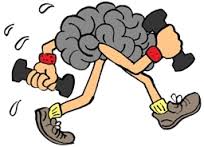 You have heard about how “brain teasers” or other “brain games” like crossword puzzles are helpful in keeping a brain healthy, and they are. Working an older person’s body – and for that matter the body of a person of any age – also improves cognitive function. I did say “any age.” Getting into better physical shape to also be in better mental shape works for caregivers and for their older care receivers. If you are a caregiver to an older loved one, you may want to encourage their physical – and mental – fitness by example.
You have heard about how “brain teasers” or other “brain games” like crossword puzzles are helpful in keeping a brain healthy, and they are. Working an older person’s body – and for that matter the body of a person of any age – also improves cognitive function. I did say “any age.” Getting into better physical shape to also be in better mental shape works for caregivers and for their older care receivers. If you are a caregiver to an older loved one, you may want to encourage their physical – and mental – fitness by example.
Researchers have studied individuals across the age spectrum to measure this association between physical fitness and mental fitness. What they consistently find is that even small changes in physical fitness can improve cognitive function at the same time the individuals improve their strength and muscular conditioning. The mental component where they see the difference is the executive function, the part of the brain responsible for focus, adaptive behavior and sorting short and long term memory.
The area in the brain where much of this happens is the hippocampus, an area that sadly shrinks with age starting in later adulthood. As the hippocampus goes through this natural regression, the individual’s memory becomes increasingly impaired and they may also become at risk for dementia. Hippocampus atrophy is considered inevitable as a person ages, but research has demonstrated that aerobic exercise can regrow the hippocampus by adding the proteins that aid in the growth of new brain cells. Now, the scientists are not saying that if you go out for a brisk walk or jog today that you will be smarter tomorrow…at least not measurably so. What they have found, however, is that people who consistently embrace even a modest exercise program for as little as a year can make a measureable difference in their cognitive fitness.
Can this reverse the effects of dementia? Unfortunately, in cases where amyloid beta plaque already has begun to form, there can be no reversal. But there is every indication that a consistent exercise program can slow the progression of a dementia, and this is all that is promised by any of the medications currently available from your physician. So, just as you would not wait until you are ill to begin exercising to get fit, you should not wait until there are significant signs of cognitive decline to start an exercise program.
The other takeaway from this growing body of research is that the “fitness message” is for caregivers every bit as much as it is for the older loved ones for whom they care. It is never too early to take steps to care for the brain, and the more steps the better.
Charlotte Bishop is a Geriatric Care Manager and founder of Creative Care Management, certified professionals who are geriatric advocates, resources, counselors and friends to older adults and their families in metropolitan Chicago. Please email your questions to info@creativecaremanagement.com.




